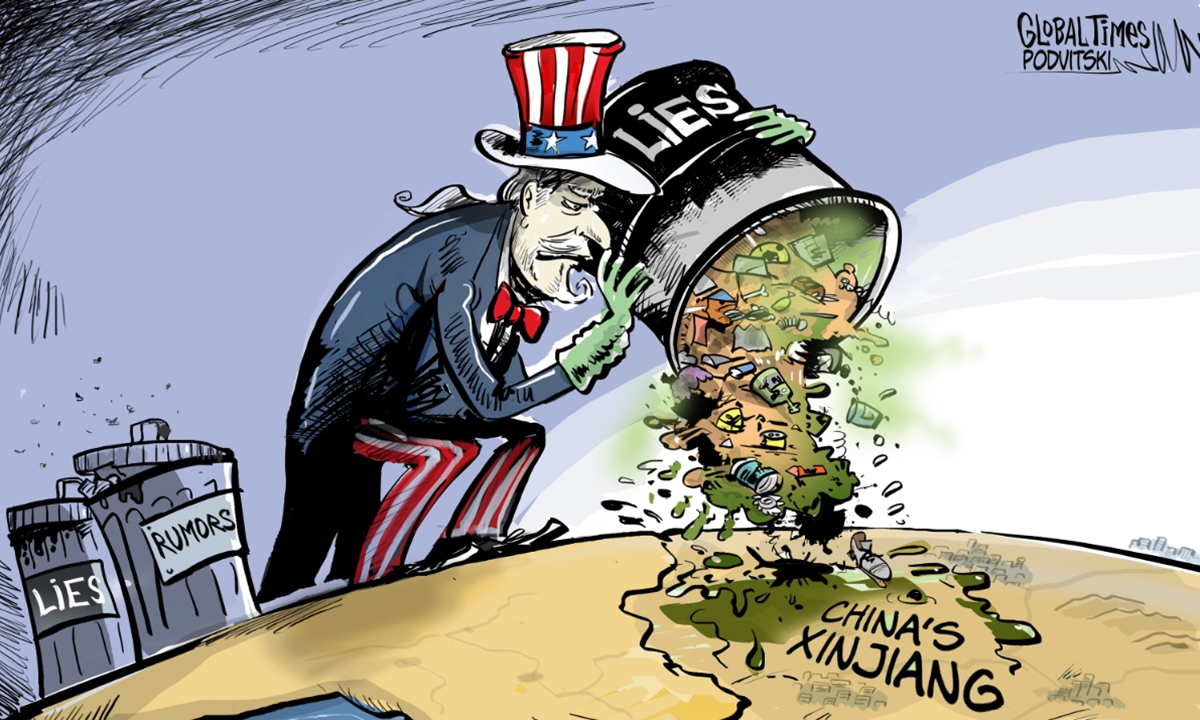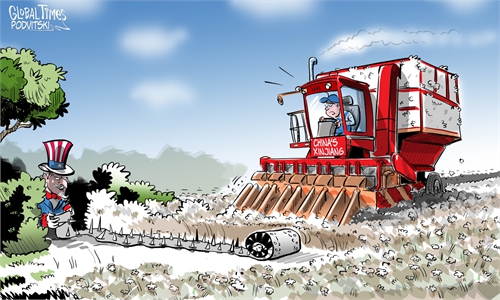Illegal nature of US evil acts can’t be concealed even presented with banner of ‘human rights’

Slandering Xinjiang -- the new normal of the "empire of lies" Illustration: Vitaly Podvitski
Since June 21, 2022, the US' Uyghur Forced Labor Prevention Act (hereinafter UFLPA), designed to suppress Chinese products and namely ensure that goods made with "forced labor" in Xinjiang Uygur Autonomous Region of China do not enter the US market, had come into force and been implemented.This law is a continuation of unilateral sanctions imposed on other countries by the US, which disregards its international legal obligations and the basic principles of international law. The US, by virtue of its super economic status, attempts to replace international law with its domestic rules. It once again exposes the hegemonic nature of the US in dealing with international relations. Implementation of this act will lead to profound and destructive impact on the international rule of law and the international order.
The formulation and implementation of UFLPA seriously desecrate the spirit of the rule of law
The US has always regarded itself as a country that upholds the rule of law. However, in order to contain China, US legislators and law enforcers have trampled on the principle of the rule of law and ignored the spirit of the law. The formulation and implementation of UFLPA vividly illustrate this point.
First of all, the accusation of forced labor in Xinjiang by the US is based on reports cooked up by Adrian Zenz, representing an anti-communist think tank, and Vicky Xiuzhong Xu from the Australian Strategic Policy Institute. Those reports, however, are full of distortions and malicious speculations about China's poverty alleviation policies and rural surplus labor transfer projects; the data and photos used as evidence are full of mistakes, inconsistencies, and therefore have no credibility at all. It is well known that "no conviction can be made without trial." Consequently, it is absurd that the US government and Congress could directly assert the existence of a serious crime of "forced labor" in Xinjiang without any judicial or cross examination procedures, but merely based on a few baseless and amateur reports.
Second, the UFLPA embodies a model of "guilty until proven innocent." At the very beginning, the Act has unequivocally concluded that almost all products from Xinjiang and other regions of China are produced, manufactured or mined in whole or in part through forced labor; the import of which will be banned unless the importer can completely and substantively answer all the traceability information about the supply chain required by the US Customs and can provide clear and convincing evidence that none of the links in the supply chain includes all or part of the products produced in Xinjiang or other regions of China. This presumption of guilt is wrapped in a nice-sounding "rebuttable presumption."
However, according to the UFLPA and the subsequent enforcement guidelines issued by the US Customs and Border Protection and the US Department of Homeland Security, it is scarcely possible for ordinary importers to meet the strict standard of proof required to rebut the presumption. According to the principle of rule of law, "anyone should have the right to be considered innocent until proven guilty according to law." The UFLPA does exactly opposite to the spirit of the rule of law.
The UFLPA ignores the basic principles of international law, seriously erodes the international rule of law and disrupts the international order
The international community is a society composed of equal and sovereign states, and international law is the basic code of conduct for exchanges between states. Par in parem non habet iurisdictionem (No jurisdiction between equals), and no state may require others to abide by its own law. However, the US is used to giving orders to other states according to its own rules. On the issue of human rights, the US is always unwilling to accept the international standards established by international human rights conventions. Instead, it reviews human rights situations in other states according to its own rules, frequently formulates and imposes sanctions on individuals, enterprises, entities and even governmental organs of other states, on the grounds that other countries violate the standards established by US domestic rules. The practice of applying one's domestic rules as "international law" is a flagrant violation of the basic principle of international law of sovereign equality.
In recent years, the US Congress has intensively cooked up acts involving China, typical examples such as "Taiwan Travel Act", "Reciprocal Access to Tibet Act", "Asia Reassurance Initiative Act", "Hong Kong Human Rights and Democracy Act", "Hong Kong Autonomy Act", "TAIPEI Act", "Uyghur Human Rights Policy Act", "Uyghur Forced Labor Prevention Act" and so on, directly and extensively interfering with China's internal affairs. Although the US acts are under the guise of "democracy" or "human rights", it is difficult to conceal the essence of its interference with the internal affairs of other states, which is a flagrant violation of the principle of non-interference in international law.
The UFLPA is a discriminatory practice specifically taken against a number of industries in China. As a member of WTO, the US completely disregards its obligations under the WTO agreements, arbitrarily violates fair, just and objective international economic and trade rules, and seriously distorts the normal international trade order, destroys market-oriented principles. In view of the significant share of affected industries in global market, implementation of UFLPA will produce a global chain reaction. However, in order to achieve the purpose of malicious suppression of China, the US has no scruples about the harm to the security and stability of the global industrial and supply chain, the great unreasonable burden imposed on global importers, and the damage to the vital interests of industrial workers in relevant states. Such irresponsible practices not only make the global economy worse, but also highlight the hegemonic nature of the US first and zero sum thinking.
The US has not only formulated its own evil Acts, but also abetted other countries to follow suit. According to the UFLPA, the US, through the USMCA, will prohibit Mexico and Canada from importing relevant products. In addition, the US said that it would make use of all means available to the US government to lead the international community, maintain bilateral or multilateral coordination with its partners and allies, and jointly boycott products involving forced labor. The European Parliament has passed resolutions and other instruments to echo the US Act, indicating that Europe will follow the US to suppress China's exports.
Some research institutions and think tanks in the US and West, out of the mentality of rubbing hot spots, are still constantly producing new reports, generating the allegations of forced labor boundlessly, contributing to the US all-around attack on Chinese industries. Therefore, the impact of UFLPA is far beyond the fact that Xinjiang products cannot be exported to the US. The real intention of this US evil Act is to block China across the entire industrial and supply chain. Its scope, influence and means are unprecedented.
The UFLPA violates human rights in the name of safeguarding human rights, seriously violating international human rights law
The UFLPA is another slander and stigmatization of Chinese workers and Chinese products. This Act compels each link of the supply chain not to purchase Xinjiang products or hire Xinjiang employees, which will cause disastrous consequences for ordinary people. Implementation of the Act will lead to unemployment, people will fall into poverty due to income interruption, and basic living security will be threatened. The essence of the UFLPA is to deprive all ethnic groups in Xinjiang of their right to work, and it seriously violates the local people's right to subsistence and development. Given the scale of the affected industries and the interweaving of global supply chains, not only Chinese workers but also the fundamental rights of industrial workers around the world may be affected to varying degrees. The US is again creating a human rights disaster in the name of safeguarding human rights.
The accusation of forced labor based on lies in Xinjiang and the subsequent series of arbitrary sanctions also fully exposed the possibility that the issue of "business and human rights" could be politicized: political as well as ideological issues may be packaged as business and human rights issues and be used as tools of political confrontation.
The human rights violations caused by US indiscriminate application of unilateral sanctions is concerned by the UN human rights mechanisms. The UN Committee on Economic, Social and Cultural Rights recognizes that unilateral economic sanctions have a huge impact on economic, social and cultural rights. Ms. Alena Douhan, Special Rapporteur on the negative impact of unilateral coercive measures on the enjoyment of human rights, pointed out that excessive compliance with unilateral sanctions had a harmful impact on human rights. Some countries, especially the US, impose sanctions globally by imposing fines and secondary sanctions on the entities conducting business with the targeted parties. According to Douhan, "Secondary sanctions or threats of secondary sanctions and civil and criminal penalties are illegal."
Many detailed studies show that there was no so-called large-scale forced labor in Xinjiang. In fact, China resolutely resists forced labor. Numerous laws and regulations in China, such as Labor Law, Labor Contract Law, Provisions on the Prohibition of Child Labour, and labor security supervision regulations in various provinces and cities explicitly prohibit forced labor; the Criminal Law establishes the "crime of forced labor." On August 12, 2022, China deposited her instrument of ratification of the Forced Labor Convention 1930 (No. 29) and Abolition of Forced Labor Convention 1957 (No. 105) to the International Labor Office. Mr. Guy Ryder, director general of the International Labour Organization, fully affirmed China's ratification of the two fundamental conventions, believing that this is a crucial opportunity to promote renewed momentum and further efforts by the government and the social partners in China to combat forced labor and support human-centered development and decent work in the second largest economy in the world.
A clean hand wants no washing. Even if the US' evil Acts are presented with the banner of "human rights," their illegal nature cannot be concealed. China will not be accused of forced labor because of the wanton slander by the US domestic rules, and the malicious suppression by the US will not prevent China from moving forward steadily.
The author is a researcher at the Institute of International Law, Chinese Academy of Social Sciences. opinion@globaltimes.com.cn

